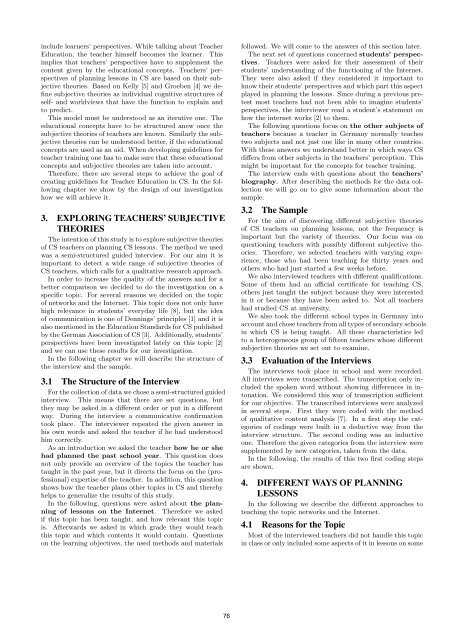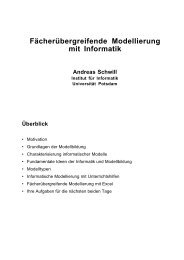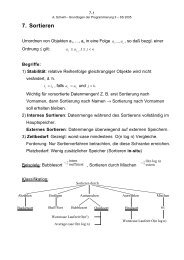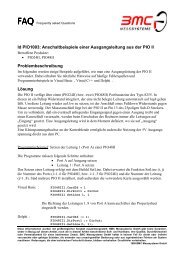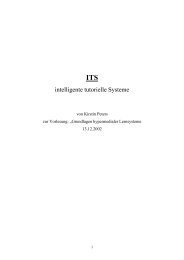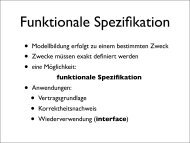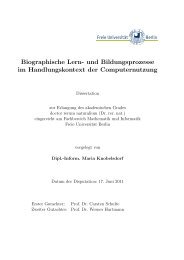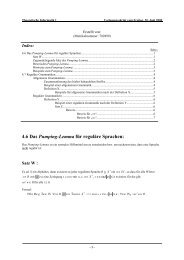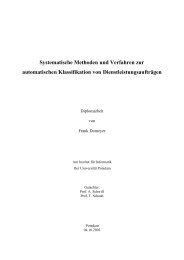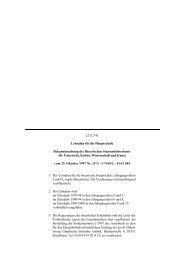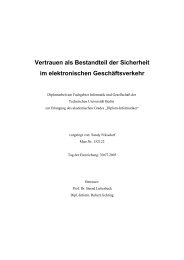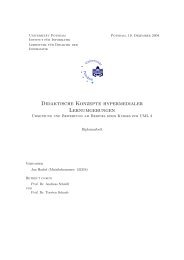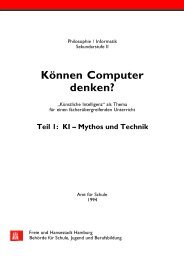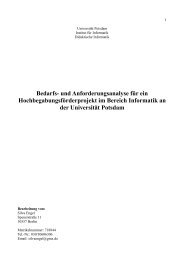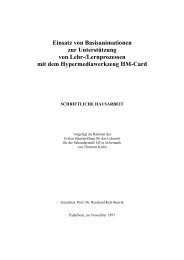Maria Knobelsdorf, University of Dortmund, Germany - Didaktik der ...
Maria Knobelsdorf, University of Dortmund, Germany - Didaktik der ...
Maria Knobelsdorf, University of Dortmund, Germany - Didaktik der ...
Create successful ePaper yourself
Turn your PDF publications into a flip-book with our unique Google optimized e-Paper software.
include learners’ perspectives. While talking about Teacher<br />
Education, the teacher himself becomes the learner. This<br />
implies that teachers’ perspectives have to supplement the<br />
content given by the educational concepts. Teachers’ perspectives<br />
<strong>of</strong> planning lessons in CS are based on their subjective<br />
theories. Based on Kelly [5] and Groeben [4] we define<br />
subjective theories as individual cognitive structures <strong>of</strong><br />
self- and worldviews that have the function to explain and<br />
to predict.<br />
This model must be un<strong>der</strong>stood as an iterative one. The<br />
educational concepts have to be structured anew once the<br />
subjective theories <strong>of</strong> teachers are known. Similarly the subjective<br />
theories can be un<strong>der</strong>stood better, if the educational<br />
concepts are used as an aid. When developing guidelines for<br />
teacher training one has to make sure that these educational<br />
concepts and subjective theories are taken into account.<br />
Therefore, there are several steps to achieve the goal <strong>of</strong><br />
creating guidelines for Teacher Education in CS. In the following<br />
chapter we show by the design <strong>of</strong> our investigation<br />
how we will achieve it.<br />
3. EXPLORING TEACHERS’ SUBJECTIVE<br />
THEORIES<br />
The intention <strong>of</strong> this study is to explore subjective theories<br />
<strong>of</strong> CS teachers on planning CS lessons. The method we used<br />
was a semi-structured guided interview. For our aim it is<br />
important to detect a wide range <strong>of</strong> subjective theories <strong>of</strong><br />
CS teachers, which calls for a qualitative research approach.<br />
In or<strong>der</strong> to increase the quality <strong>of</strong> the answers and for a<br />
better comparison we decided to do the investigation on a<br />
specific topic. For several reasons we decided on the topic<br />
<strong>of</strong> networks and the Internet. This topic does not only have<br />
high relevance in students’ everyday life [8], but the idea<br />
<strong>of</strong> communication is one <strong>of</strong> Dennings’ principles [1] and it is<br />
also mentioned in the Education Standards for CS published<br />
by the German Association <strong>of</strong> CS [3]. Additionally, students’<br />
perspectives have been investigated lately on this topic [2]<br />
and we can use these results for our investigation.<br />
In the following chapter we will describe the structure <strong>of</strong><br />
the interview and the sample.<br />
3.1 The Structure <strong>of</strong> the Interview<br />
For the collection <strong>of</strong> data we chose a semi-structured guided<br />
interview. This means that there are set questions, but<br />
they may be asked in a different or<strong>der</strong> or put in a different<br />
way. During the interview a communicative confirmation<br />
took place. The interviewer repeated the given answer in<br />
his own words and asked the teacher if he had un<strong>der</strong>stood<br />
him correctly.<br />
As an introduction we asked the teacher how he or she<br />
had planned the past school year. This question does<br />
not only provide an overview <strong>of</strong> the topics the teacher has<br />
taught in the past year, but it directs the focus on the (pr<strong>of</strong>essional)<br />
expertise <strong>of</strong> the teacher. In addition, this question<br />
shows how the teacher plans other topics in CS and thereby<br />
helps to generalize the results <strong>of</strong> this study.<br />
In the following, questions were asked about the planning<br />
<strong>of</strong> lessons on the Internet. Therefore we asked<br />
if this topic has been taught, and how relevant this topic<br />
is. Afterwards we asked in which grade they would teach<br />
this topic and which contents it would contain. Questions<br />
on the learning objectives, the used methods and materials<br />
76<br />
followed. We will come to the answers <strong>of</strong> this section later.<br />
The next set <strong>of</strong> questions concerned students’ perspectives.<br />
Teachers were asked for their assessment <strong>of</strong> their<br />
students’ un<strong>der</strong>standing <strong>of</strong> the functioning <strong>of</strong> the Internet.<br />
They were also asked if they consi<strong>der</strong>ed it important to<br />
know their students’ perspectives and which part this aspect<br />
played in planning the lessons. Since during a previous pretest<br />
most teachers had not been able to imagine students’<br />
perspectives, the interviewer read a student’s statement on<br />
how the internet works [2] to them.<br />
The following questions focus on the other subjects <strong>of</strong><br />
teachers because a teacher in <strong>Germany</strong> normally teaches<br />
two subjects and not just one like in many other countries.<br />
With these answers we un<strong>der</strong>stand better in which ways CS<br />
differs from other subjects in the teachers’ perception. This<br />
might be important for the concepts for teacher training.<br />
The interview ends with questions about the teachers’<br />
biography. After describing the methods for the data collection<br />
we will go on to give some information about the<br />
sample.<br />
3.2 The Sample<br />
For the aim <strong>of</strong> discovering different subjective theories<br />
<strong>of</strong> CS teachers on planning lessons, not the frequency is<br />
important but the variety <strong>of</strong> theories. Our focus was on<br />
questioning teachers with possibly different subjective theories.<br />
Therefore, we selected teachers with varying experience,<br />
those who had been teaching for thirty years and<br />
others who had just started a few weeks before.<br />
We also interviewed teachers with different qualifications.<br />
Some <strong>of</strong> them had an <strong>of</strong>ficial certificate for teaching CS,<br />
others just taught the subject because they were interested<br />
in it or because they have been asked to. Not all teachers<br />
had studied CS at university.<br />
We also took the different school types in <strong>Germany</strong> into<br />
account and chose teachers from all types <strong>of</strong> secondary schools<br />
in which CS is being taught. All these characteristics led<br />
to a heterogeneous group <strong>of</strong> fifteen teachers whose different<br />
subjective theories we set out to examine.<br />
3.3 Evaluation <strong>of</strong> the Interviews<br />
The interviews took place in school and were recorded.<br />
All interviews were transcribed. The transcription only included<br />
the spoken word without showing differences in intonation.<br />
We consi<strong>der</strong>ed this way <strong>of</strong> transcription sufficient<br />
for our objective. The transcribed interviews were analyzed<br />
in several steps. First they were coded with the method<br />
<strong>of</strong> qualitative content analysis [7]. In a first step the categories<br />
<strong>of</strong> codings were built in a deductive way from the<br />
interview structure. The second coding was an inductive<br />
one. Therefore the given categories from the interview were<br />
supplemented by new categories, taken from the data.<br />
In the following, the results <strong>of</strong> this two first coding steps<br />
are shown.<br />
4. DIFFERENT WAYS OF PLANNING<br />
LESSONS<br />
In the following we describe the different approaches to<br />
teaching the topic networks and the Internet.<br />
4.1 Reasons for the Topic<br />
Most <strong>of</strong> the interviewed teachers did not handle this topic<br />
in class or only included some aspects <strong>of</strong> it in lessons on some


